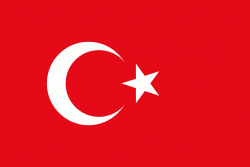Hadim
The area now known as Hadim was settled by a tribe of Turkmen originating from Bukhara following the Seljuk victory at the battle of Malazgirt. Hadim was well regarded in Ottoman times as a source for Islamic scholars and their training, this is reflected in the villages previous name, Belde-i Hadimül-ilm meaning place which serves the sciences.
The scholars of Hadim fulfilled an important role in the Turkification of Anatolia. A notable scholar from Hadim was Seyyid Bayram Veli who founded the village of Dedemli in Hadim district. Bayram Veli was a dervish who had migrated from the region of Khorosan to avoid the incoming Mongol invasion. He was known to give spiritual and religious advice to sultan Alâeddin Keykubat I of the Sultanate of Rum.
Hadim had a number of Sayyid families with many of them the descendants of Hüsameddin Efendi who was a descendant of Ja'far al-Sadiq. the most influential of Hüsameddins descendants was Ebu Said Muhammed Hâdimî. Ebu Said hadimi was known as one of the greatest scholars of his time and performed sermons in the Ayasofya-i Kebir Cami-i Şerifi upon the invitation of sultan Mahmud I
Map - Hadim
Map
Country - Turkey
 |
|
| Flag of Turkey | |
One of the world's earliest permanently settled regions, present-day Turkey was home to important Neolithic sites like Göbekli Tepe, and was inhabited by ancient civilisations including the Hattians, Hittites, Anatolian peoples, Mycenaean Greeks, Persians and others. Following the conquests of Alexander the Great which started the Hellenistic period, most of the ancient regions in modern Turkey were culturally Hellenised, which continued during the Byzantine era. The Seljuk Turks began migrating in the 11th century, and the Sultanate of Rum ruled Anatolia until the Mongol invasion in 1243, when it disintegrated into small Turkish principalities. Beginning in the late 13th century, the Ottomans united the principalities and conquered the Balkans, and the Turkification of Anatolia increased during the Ottoman period. After Mehmed II conquered Constantinople (Istanbul) in 1453, Ottoman expansion continued under Selim I. During the reign of Suleiman the Magnificent, the Ottoman Empire became a global power. From the late 18th century onwards, the empire's power declined with a gradual loss of territories. Mahmud II started a period of modernisation in the early 19th century. The Young Turk Revolution of 1908 restricted the authority of the Sultan and restored the Ottoman Parliament after a 30-year suspension, ushering the empire into a multi-party period. The 1913 coup d'état put the country under the control of the Three Pashas, who facilitated the Empire's entry into World War I as part of the Central Powers in 1914. During the war, the Ottoman government committed genocides against its Armenian, Greek and Assyrian subjects. After its defeat in the war, the Ottoman Empire was partitioned.
Currency / Language
| ISO | Currency | Symbol | Significant figures |
|---|---|---|---|
| TRY | Turkish lira | ₺ | 2 |
| ISO | Language |
|---|---|
| AV | Avar language |
| AZ | Azerbaijani language |
| KU | Kurdish language |
| TR | Turkish language |















